Summary 
A superbly played Benedick with expertly droll comic timing brings down the house, and a sassy Beatrice along with very good supporting performances make for fine outdoor entertainment. Audience-pleasing second-half silliness feels comparatively lightweight and corny, but the production overall is well staged, attractively costumed, and laced with lovely incidental music.
Design
Directed by B.J. Jones. Set by Troy Hemmerling. Costumes by Janet L. Swenson. Lights by Donna Ruzika. Compositions and sound by Lindsay Jones. Fights by T. Anthony Marotta.
Cast
Robert Ramirez (Leonato), Kymberly Mellen (Beatrice), Sara J. Griffin (Hero), Gary Neal Johnson (Don Pedro), Ryan Imhoff (Don John), Matt Tallman (Claudio), David Ivers (Benedick), John Oswald (Antonio), Robert Thompson, Jr. (Conrade), Michael Cotey (Borachio), Kate Cook (Margaret), Chelsea Steverson (Ursula), Don Burroughs (Dogberry).
Analysis
B.J. Jones' final preview of Much Ado About Nothing, outdoors at the Utah Shakespearean Festival, is a well-staged summer comedy, the stage strewn with fallen red and green leaves, an elaborate staircase at stage right, and an abundance of wine and whiskey barrels, plus wooden tables and benches. The production begins with the wartime women and children - including Kymberly Mellen as Beatrice along with her real-life kids - dancing a hoedown with scarves and assembling an energetic barn-dance line. Fiddles play as the characters dance, Dogberry and the green-clad Vargas in the balcony leading a colorful ragtag trio of musicians who also serve as the bumbling second-act watch. A loud cannon shot disrupts the dancing 1.1 and a soldier messenger arrives with a dramatic cymbal crash to begin the production.
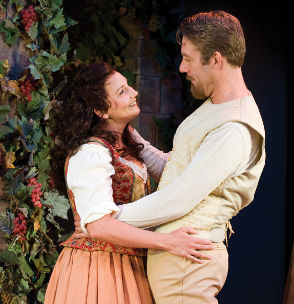
David Ivers' droll Benedick leads the soldiers' return home, engaging in sword play with the youthful Claudio to another cymbal crash, the warriors clad in beige pants with black boots and purple military waistcoats. Ivers' Benedick, tall and thin with sandy hair and a rugged goatee, is delightfully witty, flashing expert comic timing - "my dear lady disdain ... are you yet living?" - as the general Don Pedro, replete in officers' uniform and yellow shoulder braids, is welcomed home along with his victorious soldiers. Benedick's repartee with Mellen's sassy Beatrice feels light but features sharp barbs, hinting at a deep prior relationship, and the festive atmosphere darkens with Benedick's stern rebuke, eye to eye with Mellen's Beatrice - "I have done" - leaving her crestfallen and the others scrambling to continue the celebration. Ivers' Benedick teases Claudio for his amorous feelings toward Hero, his jibes flecked with some longtime bachelor bitterness, and he plunges the younger man's sword into his scabbard with sexual innuendo, drolly drones "Sigh Away Sundays," and exits making animal horns with his fingers and charging off like a comically fierce bull.
Mellen's mature and sharp-tongued Beatrice, matronly but attractively busty and vibrant in a light orange and peach dress, in turn joins Margaret and Ursula in teasing Hero - "stop it!" - with a phallic gesture and girlish giggles about the worldly Count Claudio.
She seems a perfect match with Ivers' witty Benedick, their union already a foregone conclusion, and Jones directs the masked 2.1 revelry with cleverness and a swift pace. Four couples, the men wearing absurd Mardi Gras-style masks, dance to an elegant minuet, as Hero and Claudio gaze longingly - and knowingly - at each other from the perimeter of the stage. Beatrice and Benedick of course spar center stage, Ivers blustering and ludicrous in a big-nosed mask and an outrageously over-the-top Borat-like accent.
Jones adroitly splashes the story with colorful supporting characters. Borachio, clad in brown leather and sporting a villain's goatee, eavesdrops on Benedick and Claudio, then pickpockets from the latter the medal awarded him for military service by Don Pedro.
The evil and hairy Don John wears a full black beard, along with a long black leather overcoat and knee-high black boots, and he disdainfully tears pages from a Bible and crumples them before tossing them to the stage. While Borachio bites an apple and flips it to Conrade, the toweringly tall Don John laughs like a cartoon scoundrel, describes himself with coldly calculated enunciation as "a ... plain ... dealing ... villain," and his callous description of "every man's Hero" brings intermission. His much older brother, the white-haired Don Pedro, appears disconsolate after his romantic overture is rejected by Mellen's ebullient Beatrice - who then displays sincere sorrow for his heartache - but gamely leads the central deceptions: "we are the only love gods!" Jones infuses the female characters with insightful touches, revealing a sultry Margaret coyly perched in Borachio's lap stage left at the production's opening, then flirting with the book-seeking Benedick, smiling seductively up at him and getting provocatively in his way. And the endearing Hero, almost beside herself with passion, responds to Claudio's tender peck by grabbing his face in her hands and lustily kissing him back, inciting spontaneous applause from the audience.
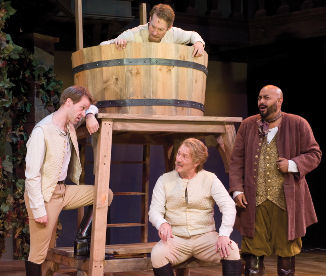
The eavesdropping scenes - Benedick in 2.3 and Beatrice 3.1 - are certainly the comic core of Much Ado About Nothing, and the scenes are wonderfully played by Ivers and Mellen. With the men above him in the balcony joining a guitar-strumming Balthasar - singing "Hey Nonnie Nonnie" - Ivers' Benedick stands immediately below, and he groans in repulsion - "aaargh" - at the sentimental song. Benedick winces as if tortured and tries covering his ears, and then finally belittles the romantic mood with a wide idiot smile and dances while running in place like a love struck schoolgirl. But once the men begin gossiping about Beatrice's passionate love for him, it is Benedick who plays the idiot, and he smashes his head against a wooden post and staggers about, then holds a bunch of grapes in front of his face to "conceal" his departure to stage left. He hides behind a big wooden wine vat where grapes are crushed, but in attempts to get closer and hear better, Iver's Benedick finds himself in a precarious leg-kicking dangle from the edge of the balcony, then concealed within an elevated wooden wine tub. Ivers' comedic timing is superb, and the scenes play with the stylishly crisp humor - physical but not slapstick, silly but not outrageous - that smacks of reality. From his hiding place, Ivers' Benedick hurls a grape at Don Pedro for an insult, then endures with audible grunts the dumping atop him of crates of grapes by the knowing Leonato. When Benedick stands, still in the tub, to defend his feelings to the audience - and to himself - he must spit out grape after grape - "the world must be peopled!" - that he has unintentionally inhaled. Ivers' Benedick transforms from a rigid bachelor to a sudden Romeo, but with comically awkward clumsiness and a gawky but confused energy, responding to Beatrice's announcement of dinner with a downstage exhibition of impromptu push-up calisthenics. After an excruciatingly long pause and a self-satisfied, "ha," his wryly self-deceived comment - "there's a double meaning in that" - nearly brings down the house. Ivers' Benedick arrives on the staircase in 3.2 with a white kerchief obscuring his face, pretending a toothache, but the love gods soon expose him - now in love, clean-shaven and wearing cologne, a blob of white tissue concealing a razor nick on his cheek - and they mock him relentlessly, Claudio upon his knees before a rapturously coy Don Pedro, covering the General's proffered arm with passionate kisses.
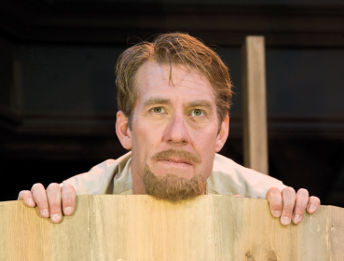
Mellen's 3.1 eavesdropping scene features a similarly sophisticated humor along with physicality. After a clever smoke signal from Margaret to Hero and Ursula via dusty rugs beaten over a wooden railing, Mellen's suddenly schoolgirl Beatrice - like her Benedick earlier - cries "what!" and bounces forehead first off a low hanging wooden beam.
With a scrambling run, she hides beneath the same barrel Benedick concealed himself within, but in her reactions to the girls' exclamations over Benedick's love for her, Mellen's animated Beatrice bumps into hanging cups and makes them clink like chimes. When she climbs closer to listen to the girls, who sit barefoot within the tub crushing grapes for wine, Beatrice finds her hand pinned beneath Hero's bottom, and she struggles and sways in a red-faced, leg-kicking dangle that inspires more applause. Beatrice's hands-on-hips outrage after the girls exit is a delight, the indignation plausibly character-driven but of course wickedly ironic and richly deserved, a contrast to the absurd (but undeniably audience-pleasing) antics of the watch that begin the second act with 3.3.
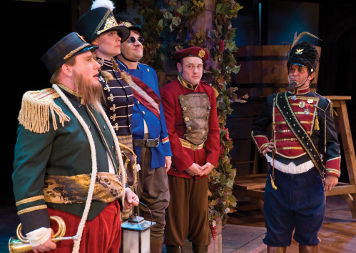
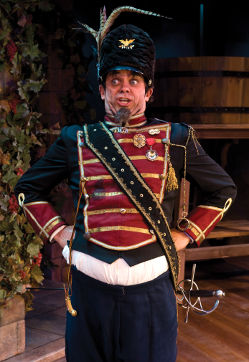
Dogberry, played by Don Burroughs in a ghastly chin beard, wears a purple constable's uniform with brown boots and a strapped black cap, fumbling and blustering like a blinking-idiot Shakespearean version of Deputy Barney Fife. The comedy is all surface slapstick, lacking the complexities of the mature characterizations of Beatrice and Benedick as well as the romantic sweetness of their idiotic behavior, but remains a pleasure to behold. Vargas blows his trumpet right into Dogberry's face before the constable briefs the watch, which includes Seacoal in a royal blue waistcoat, nearly blind behind really thick black glasses. Seacoal frequently gestures into open space and wanders off in the wrong direction, but he leads the watch in their eavesdropping on the schemes of Conrade and Borachio. The bereted Hugh Oatcake, resplendent in scarlet red, sneaks under the elevated wine barrel to tie the shoelaces of Conrade to Borachio's, so when they are confronted - a shouting Seacoal pointing in the wrong direction and accusing no one - they start to run but trip and fall and are apprehended. Burrough's Dogberry becomes the audience favorite, returning with his hair in a white bath towel, his face covered in moisturizing cream, and he conducts the 4.2 examination by calling Borachio a "naughty varlet" and punching him in the chest. Dogberry's vain proclamation - "I'm as pretty a piece of flesh as they have in Messina!" - incites howls, but his police work is so shoddy that a resigned Conrade simply manacles himself.
Jones minimizes the heartbreak within the 4.1 wedding scene, highlighting the lovely background singing, the men in white dress-military uniforms, and the girls bantering happily in the balcony. Claudio erupts during the ceremony, shoving Hero down - "rotten orange!" - yanking white banners from their moorings in the balcony, then hurling them at her as she sprawls in confused terror. Margaret, witnessing the accusation, seems to realize she has been deceived into being mistaken for Hero, and she looks aghast, covering her mouth in horror and turning away, but she says nothing. Hero sobs and screams, then hurls herself at the rigid Claudio, who rejects her. The moments of unpleasant cruelty are short-lived, segueing into Benedick's and Beatrice's first words of mutual affection, she downstage in tears and he returning from beneath the balcony. Beatrice's command - "kill Claudio!" - is met with another expert pause from Ivers' Benedick, then a growling "aarrgh" before his "not for the wide world" initial refusal. When Beatrice beats him with a pillow - "I'd eat his heart" - Ivers' Benedick reconsiders, and he subsequently challenges Claudio - "you are a villain" - knocking his friend to the ground and with a fiercely angry expression - "jest not" - he drops his gage and storms offstage.
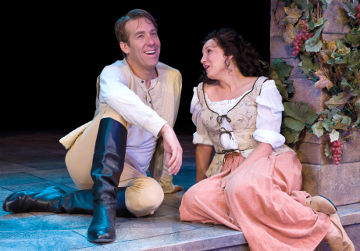
The happy ending comes quickly but far from dramatically, more of a complaint against Shakespeare's text - with Don John's offstage flight, capture and confession - than Jones' charming production. During 5.2, with the Claudio-Hero situation as yet unresolved, Ivers' Benedick woefully croons his love sonnet addressed to Beatrice - "God above!" - then confides to the audience his inability to find a rhyme for "lady" other than "baby." When Beatrice enters, they embrace and passionately fall to the stage, but their kiss is interrupted before it can begin, and they lie dejectedly on their backs, responding wanly to a quite confused messenger. Claudio's 5.3 atonement is well played, with he and Don Pedro under-lit from a trap representing Hero's tomb as stage fog billows around them in the semi-darkness, a guitarist strumming in a balcony and white-veiled ladies - including Hero herself - dropping fluttering blue flower petals down upon them like forgiveness. When Hero descends to the stage, moving slowly down the curving stage-right staircase, she is embraced by Don Pedro as Claudio - "another Hero!" - drops to one knee and bows his head.
Jones concludes the sweetly romantic production with Beatrice and Benedick stalking off to opposite sides of downstage, claiming a decided lack of deep feelings. Their anger fades, however, when they read each other's sonnets - Beatrice: "baby!" - and they move to one another to embrace at center stage. With Claudio and Hero somehow reconciled and entwined above in the balcony, Jones even includes a happy resolution for Don Pedro, as Benedick forgivingly kisses him atop his balding head and pushes the giggling Ursula into his arms.